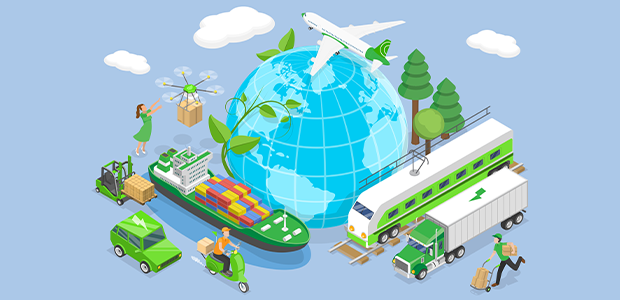
Green Fulfilment: optimising logistics for eco-conscious startups
Discover how eco-conscious startups are reducing costs and emissions with smarter packaging, tech-led warehousing, and efficient delivery strategies.
Building a low-impact brand starts with smarter logistics
A single parcel delivered in the UK can generate up to half a kilogram of CO₂, according to recent estimates from DEFRA. Multiply that by hundreds or thousands of orders a month, and it’s clear how quickly logistics becomes a major contributor to a startup’s carbon footprint. Yet for many early-stage brands, fulfilment is treated as a behind-the-scenes function rather than a strategic priority.
That’s a missed opportunity. Logistics is often where environmental and economic performance collide. Get it right, and you can reduce emissions, cut costs, and improve customer experience all at once. Get it wrong, and inefficiencies stack up quickly.
For startups trying to grow sustainably, logistics shouldn’t be an afterthought. It’s a powerful lever, and one that’s easier to optimise early than overhaul later.
The hidden impact of early logistics decisions
In the rush to launch and deliver, many startups rely on ad hoc logistics setups: overspending on packaging, over-ordering stock, or choosing fulfilment options based solely on speed. These decisions may work in the short term, but they create friction as the business scales.
The environmental cost is also significant. UK government data shows that transport is still the largest source of greenhouse gas emissions, with vans and HGVs making up a growing share. At the same time, consumers are increasingly making purchasing decisions based on whether a brand aligns with their values.
According to Deloitte, over one-third of UK consumers have stopped buying from certain brands because of sustainability concerns. The way you pack, store, and ship goods isn’t just a back-office function; it shapes how your brand is perceived.
Smarter fulfilment = lower footprint, lower costs
Contrary to what many assume, sustainable logistics doesn’t require premium packaging or slower delivery options. In fact, many of the most effective changes are about removing waste and improving fit-for-purpose decisions.
Packaging efficiency, for instance, is a quick win. Using right-sized boxes cuts material costs and avoids paying to ship air. Recyclable or compostable materials may also exempt you from Plastic Packaging Tax obligations in the UK, which affects businesses using less than 30% recycled plastic. Smaller, lighter parcels also reduce transport emissions and fees.
Energy-conscious warehousing is another area with clear benefits. Startups using shared fulfilment centres with energy-efficient lighting, heating, and motion sensors not only lower their environmental impact, but also avoid the cost of running their own space inefficiently.
Delivery offers even more room for savings. Route optimisation and batching can dramatically reduce mileage and fuel costs. Some providers now offer consolidated deliveries or electric vehicle options as standard, a smart move for urban brands trying to avoid congestion charges and emissions penalties.
Technology can amplify all of this. Providers like Green Fulfilment use in-house platforms to automate inventory tracking, batch orders intelligently, and optimise warehouse flows. For early-stage startups, that level of visibility and control can reduce overheads and prevent the operational drag that slows growth later on.
Sustainability builds brand trust
Today’s consumers are paying close attention to how products reach their door. Gen Z in particular expects brands to take real responsibility for their environmental impact, not just talk about it. That means your logistics choices, from the materials you pack with to the emissions behind each delivery, are under scrutiny. Getting this right doesn’t just tick a box. It can build trust, loyalty, and long-term advocacy.
But beyond the customer lens, early-stage investors and B2B buyers are also asking tougher sustainability questions. Demonstrating that you’ve embedded sustainability into your logistics from day one shows foresight and commercial maturity. For some, it’s the deciding factor in whether to invest or partner.
First steps to smarter, low-impact logistics
The key is not to overhaul everything at once. Instead, startups should start by reviewing packaging, evaluating current delivery partnerships, and assessing energy use across storage and fulfilment.
Outsourcing can help. A logistics partner already built around low-waste, energy-efficient practices gives you access to eco-conscious infrastructure without the cost of building it in-house.


